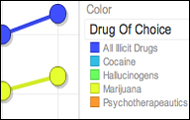
Illicit drug use is on the rise, with marijuana the illegal drug of choice and young males the most likely current users, according to new federal numbers released this week.
The federal government's 2009 National Survey on Drug Use and Health found a total of 21.8 million Americans ages 12 and up admitted using illicit drugs in the month before they were surveyed -- an increase of 0.7 percent from 2008. But some drugs were more popular than others, and not all demographics used at the same rate.
Use the motion chart below to track trends in illicit drug use since 2002:
Marijuana maintained its status as the most-used drug among current illicit drug users, followed by psychotherapeutics (used non-medically), cocaine (which includes crack), hallucinogens, inhalants and heroin, according to the study conducted by the Substance Abuse and Mental Health Services Administration.
Marijuana also saw the greatest increase in use from 2008 to 2009, moving from 6.1 to 6.6 percent of the 67,500 people surveyed. Researchers also cited a significant increase in illicit psychotherapeutic use, from 2.5 to 2.8 percent, with stimulants and sedatives being used the most.
Conducted annually, the survey provides national and state-level data on the use of tobacco, alcohol, illicit drugs (including non-medical use of prescription drugs) and mental health.
Who Is Using Illicit Drugs?
Young adults had the highest rate of current illicit drug use, with 22.2 percent of 18- to 20-year-olds using, and 20.5 percent of 21- to 25-year-olds. Of those two, the 21- to 25-year-olds saw a significant increase from the previous year's survey, along with 16- or 17-year-olds, and baby boomers between the ages 50 to 54. The latter saw the greatest increase, rising from 4.3 percent in 2008 to 6.9 in 2009.
Males were more often current illicit drug users at 10.8 percent compared to 6.6 percent of females. They also saw a greater increase in drug use from 2008 to 2009, rising 0.9 percent to the females 0.3. Broken down by drug, though, males and females had the same current use rate for non-medical tranquilizers and methamphetamine.
Educational attainment also seemed to influence who was more likely to be a current illicit drug users. College graduates were less likely to be users at 6.1 percent than those without a high school degree, at 10.2. Those with some college had a higher rate of drug use, at 9.8 percent, than high school graduates, at 8.8. And adults with a college degree had a higher rate of trying drugs over the course of their life than those without a high school degree -- 51.8 to 39.7 percent.
Race and employment status were significant factors. Among American Indian or Alaska Natives, 18.3 percent were current drug users -- a rise from 9.5 in 2008 -- compared to 3.7 percent of Asians. Hispanics also saw a larger increase in use.
For adults ages 18 and up, the unemployed were more than twice as likely than those with full-time jobs to be current users. Researchers said "17.0 percent were current illicit drug users, which was higher than the 8.0 percent of those employed full time and 11.5 percent of those employed part time.
"However," they added, "most illicit drug users were employed. Of the 19.3 million current illicit drug users aged 18 or older in 2009, 12.9 million (66.6 percent) were employed either full or part time."
The survey also found that the number of unemployed illicit drug users age 18 and older is up 1.2 million since 2007 and up 700,000 since 2008 to a total of 2.5 million in 2009. The increase, researchers said, is "primarily because of an overall increase in the number of unemployed persons."
(2009 National Survey on Drug Use and Health)
Data visualization by Anthony Calabrese, a State of the USA Web producer.
 Print This
Print This RSS Feed
RSS Feed